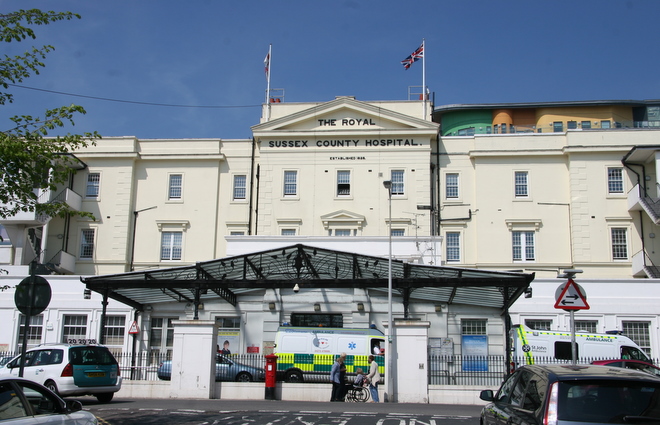The NHS trust that runs Brighton and Hove’s main hospital said that it had already started making improvements after a critical inspection by the Care Quality Commission (CQC).
Brighton and Sussex University Hospitals NHS Trust said that the first improvements – in response to fire safety concerns at the Royal Sussex County Hospital – were made within 20 minutes.
The trust issued a statement this morning (Wednesday 17 August). It said: “Since the Care Quality Commission carried out their inspection of the trust in April, significant improvements have already been made. These include
Emergency Department redesign
A redesign of the assessment area in the Emergency Department at the Royal Sussex County Hospital has been completed. This has created a new area with more assessment cubicles to speed up the assessment process for patients arriving by ambulance. Further more widespread redesign is in the planning stage.
Urgent Care Centre redesign
Building work has just begun in the Urgent Care Centre to create a better and more efficient environment for patients who need urgent, but not emergency, care. The redevelopment will create a new waiting room, reception area, front door and treatment rooms.
Better management of emergency patients
Escalation processes have been changed to better manage emergency patients at the Royal Sussex County and Princess Royal Hospitals during periods of high demand.
Quality and safety checklists
Patient quality and safety checklists have been implemented in the Emergency Department, incorporating ‘comfort rounds’ for patients awaiting a cubicle who have been brought in by ambulance.
Surgical Assessment Unit
A 24/7 surgical assessment unit has been opened for patients referred by GPs, which has increased the number of patients that can be seen.
Critical Care staffing
Critical care nurse staffing numbers have been increased with specialist neurosurgical critical care expertise.
BSUH Improvement Academy
A quality improvement programme has been launched called the ‘BSUH Improvement Academy’ which trains staff to identify where positive changes can be made in their area.
Hand hygiene
The trust has launched the campaign ‘Clean Hands Save Lives’ to help ensure staff, patients and visitors regularly wash their hands in hospital. Immediate action has also been taken on the trust’s hand hygiene policy with clinical areas being regularly audited. There has been a significant shift in compliance as a result.
Outpatient prescriptions
The processes for managing outpatient prescriptions have been revised to ensure they are in line with national standards.
Corporate governance
New corporate governance structures and arrangements are being put in place to ensure the trust board, executives and directors have better oversight of safety and quality of care and that issues that need to be addressed can be identified more thoroughly. We are working to develop a culture of equality, fairness and accountability, with sustainable effective leadership, where patients are cared for in an appropriate environment.
Clinical governance
The clinical governance throughout the trust is being redesigned from ‘floor to board’ to ensure issues can be better identified and processes are improved to ensure high levels of patient care.
Programme Management Office
A Programme Management Office (PMO) has been created to manage the trust-wide programmes to improve the quality and safety of care.
Fire safety
Fire risk assessments have been carried out and brought up-to-date to ensure patients are being treated in a safe environment.
Staffing levels
Staffing levels have been reviewed to ensure adequate staffing levels are in place to ensure safe patient care.
Appointments
We have made a number of new senior appointments, including a director of strategy, director of performance and director of clinical governance. These appointments have been supplemented by the appointments of a turnaround director and improvement director.
Monitoring and assurance
The trust has first drafts of all metrics in integrated dashboard for ‘floor to board’ assurance on key trust-wide and local service issues.
Medicine safety
Medicine safety has been improved throughout the trust by the building of a drugs preparation room in the Emergency Department and improving the process for advanced nurse practitioners prescribing drugs.
‘Repatriation’ of out-of-area patients
Agreement has been secured with all referring hospitals that patients are to be repatriated to their local hospital within 48 hours of completing treatment at the trust. This means they will be closer to their families and friends and frees beds in the trust for more acutely ill patients.









